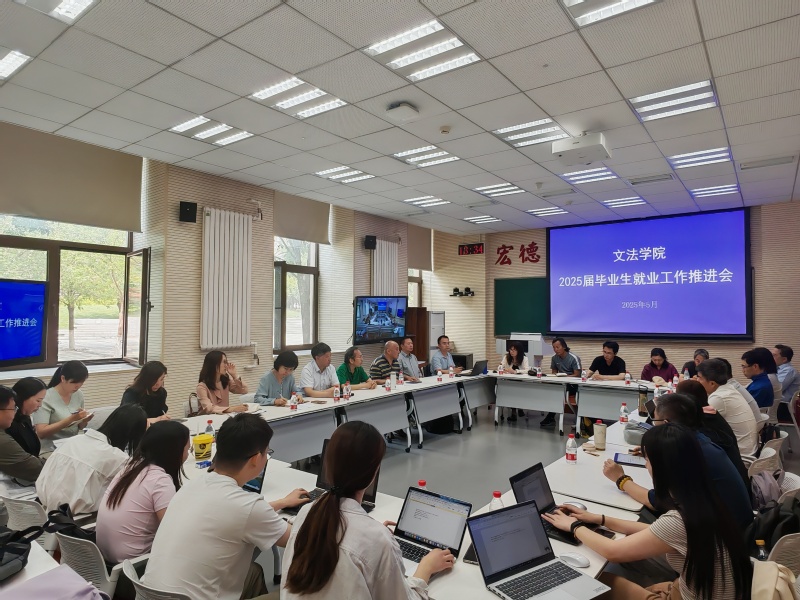College of Humanities and Law Holds Meeting to Advance Employment for Class of 2025 Graduates
To thoroughly implement the directives on graduate employment from the central and municipal governments and meet the requirements of the Ministry of Education, Beijing Municipality, and the university, the College of Humanities and Law convened a working conference on May 16 at the East Campus to promote employment for the Class of 2025 graduates. In attendance were the College’s Party and administrative leaders, department chairs, Party branch secretaries, employment coordinators for graduate and undergraduate students, as well as counselors, class advisors, and faculty representatives. The meeting was presided over by Party Secretary Zhang Liang.

Vice Dean Xue Changli began the meeting by presenting the enrollment plans for each major for the upcoming academic year. He emphasized the intrinsic connection between enrollment, education, and employment. While enrollment brings new vitality to the cultivation system, the quality of the incoming students is of vital importance. However, what is more crucial is talent cultivation. Graduate employment outcome is a key indicator for evaluating the effectiveness of the College’s educational efforts.
Li Haiyong, Deputy Party Secretary, and Xu Jun, Vice Dean, respectively presented data-driven reports on the overall employment outcomes for the College’s Class of 2025 undergraduates and postgraduates. They analyzed the employment trends and potential challenges. Vice Dean Zheng Yanyang shared best practices in promoting employment. She stressed the necessity of seizing the current opportunities, continuously strengthening ideological guidance, and further refining employment counseling for students.
Participants engaged in an in-depth discussion on the current employment situation, student support, job recommendations, and graduation procedures, further reaching a consensus on these issues.
Dean Zhang Jianwei emphasized that enrollment, cultivation, and employment constitute an interconnected and comprehensive system, and that achieving high-quality employment outcomes requires coordinated efforts from all parties. He urged faculty and postgraduate supervisors to take the initiative to support students by capitalizing on their academic expertise, gaining a thorough understanding students’ career goals and employment preferences, and helping graduates secure employment at an early stage.
In his concluding remarks, Secretary Zhang Liang stressed that employment is a fundamental aspect of people’s livelihoods and directly concerns the well-being of each graduate. He emphasized that employment is a top-priority task for the college leadership and a key pillar supporting high-quality talent cultivation. He called on all faculty and staff to align their understanding, enhance their political awareness, and fully recognize the importance of employment work. Secretary Zhang argued each discipline should adopt proactive and innovative approaches tailored to their specific circumstances, and take multiple measures to intensify efforts in career counseling, job development, and targeted student support. He stressed the need to refine work plans, strengthen accountability mechanisms, and enhance collaborative efforts to ensure steady progress toward employment goals. These efforts, he noted, will contribute to the university’s efforts in advancing the “Double First-Class” initiative.

